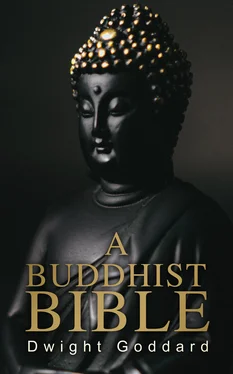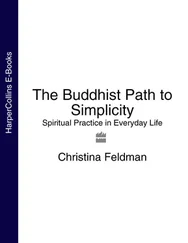*
Then said Mahamati to the Blessed One: Why is it that the ignorant are given up to discrimination and the wise are not?
The Blessed One replied: It is because the ignorant cling to names, signs and ideas; as their minds move along these channels they feed on multiplicities of objects and fall into the notion of an ego-soul and what belongs to it; they make discriminations of good and bad among appearances and cling to the agreeable. As they thus cling there is a reversion to ignorance, and karma born of greed, anger and folly, is accumulated. As the accumulation of karma goes on they become imprisoned in a cocoon of discrimination and are thenceforth unable to free themselves from the round of birth and death.
Because of folly they do not understand that all things are like maya, like the reflection of the moon in water, that there is no self-substance to be imagined as an ego-soul and its belongings, and that all their definitive ideas rise from their false discriminations of what exists only as it is seen of the mind itself. They do not realise that things have nothing to do with qualified and qualifying, nor with the course of birth, abiding and destruction, and instead they assert that they are born of a creator, of time, of atoms, of some celestial spirit. It is because the ignorant are given up to discrimination that they move along with the stream of appearances, but it is not so with the wise.
Chapter II
False-Imagination and Knowledge of Appearances
Table of Contents
Then Mahamati the Bodhisattva-Mahasattva spoke to the Blessed One, saying: You speak of the erroneous views of the philosophers, will you please tell us of them, that we may be on our guard against them?
The Blessed One replied, saying: Mahamati, the error in these erroneous teachings that are generally held by the philosophers lies in this: they do not recognise that the objective world rises from the mind itself; they do not understand that the whole mind-system also rises from the mind itself; but depending upon these manifestations of the mind as being real they go on discriminating them, like the simple-minded ones that they are, cherishing the dualism of this and that, of being and non-being, ignorant of the fact that there is but one common Essence.
On the contrary my teaching is based upon the recognition that the objective world, like a vision, is a manifestation of the mind itself; it teaches the cessation of ignorance, desire, deed and causality; it teaches the cessation of suffering that arises from the discriminations of the triple world.
There are some Brahman scholars who, assuming something out of nothing, assert that there is a substance bound up with causation which abides in time, and that the elements that make up personality and its environment have their genesis and continuation in causation and after thus existing, pass away. Then there are other scholars who hold a destructive and nihilistic view concerning such subjects as continuation, activity, breaking-up, existence, Nirvana, the Path, karma, fruition and Truth. Why? Because they have not attained an intuitive understanding of Truth itself and therefore they have no clear insight into the fundamentals of things. They are like a jar broken into pieces which is no longer able to function as a jar; they are like a burnt seed which is no longer capable of sprouting. But the elements that make up personality and its environment which they regard as subject to change are really incapable of uninterrupted transformations. Their views are based upon erroneous discriminations of the objective world; they are not based upon the true conception.
Again, if it is true that something comes out of nothing and there is the rise of the mind-system by reason of the combination of the three effect-producing causes, we could say the same of any non-existing thing: for instance, that a tortoise could grow hair, or sand produce oil. This proposition is of no avail; it ends in affirming nothing. It follows that the deed, work and cause of which they speak is of no use, and so also is their reference to being and non-being. If they argue that there is a combination of the three effect-producing causes, they must do it on the principle of cause and effect, that is, that something comes out of something and not out of nothing. As long as a world of relativity is asserted, there is an ever recurring chain of causation which cannot be denied under any circumstance, therefore we cannot talk of anything coming to an end or of cessation. As long as these scholars remain on their philosophical ground their demonstration must conform to logic and their textbooks, and the memory-habit of erroneous intellection will ever cling to them. To make the matter worse, the simple-minded ones, poisoned by this erroneous view, will declare this incorrect way of thinking taught by the ignorant, to be the same as that presented by the All-knowing One.
But the way of instruction presented by the Tathagatas is not based on assertions and refutations by means of words and logic. There are four forms of assertion that can be made concerning things not in existence, namely, assertions made about individual marks that are not in existence; about objects that are not in existence; about a cause that is non-existent; and about philosophical views that are erroneous. By refutation is meant that one, because of ignorance, has not examined properly the error that lies at the base of these assertions.
The assertion about individual marks that really have no existence, concerns the distinctive marks as perceived by the eye, ear, nose, etc., as indicating individuality and generality in the elements that make up personality and its external world; and then, taking these marks for reality and getting attached to them, to get into the habit of affirming that things are just so and not otherwise.
The assertion about objects that are non-existent is an assertion that rises from attachment to these associated marks of individuality and generality. Objects in themselves are neither in existence nor in non-existence and are quite devoid of the alternative of being and non-being, and should only be thought of as one thinks of the horns of a hare, a horse, or a camel, which never existed. Objects are discriminated by the ignorant who are addicted to assertion and negation, because their intelligence has not been acute enough to penetrate into the truth that there is nothing but what is seen of the mind itself.
The assertion of a cause that is non-existent assumes the causeless birth of the first element of the mind-system which later on comes to have only a maya-like non-existence. That is to say, there are philosophers who assert that an originally un-born mind-system begins to function under the conditions of eye, form, light and memory, which functioning goes on for a time and then ceases. This is an example of a cause that is non-existent.
The assertion of philosophical views concerning the elements that make up personality and its environing world that are non-existent, assume the existence of an ego, a being, a soul, a living being, a "nourisher," or a spirit. This is an example of philosophical views that are not true. It is this combination of discrimination of imaginary marks of individuality, grouping them and giving them a name and becoming attached to them as objects, by reason of habit-energy that has been accumulating since beginningless time, that one builds up erroneous views whose only basis is false-imagination. For this reason Bodhisattvas should avoid all discussions relating to assertions and negations whose only basis is words and logic.
Word-discrimination goes on by the coordination of brain, chest, nose, throat, palate, lips, tongue, teeth and lips. Words are neither different nor not-different from discrimination. Words rise from discrimination as their cause; if words were different from discrimination they could not have discrimination for their cause; then again, if words are not different, they could not carry and express meaning. Words, therefore, are produced by causation and are mutually conditioning and shifting and, just like things, are subject to birth and destruction.
Читать дальше












